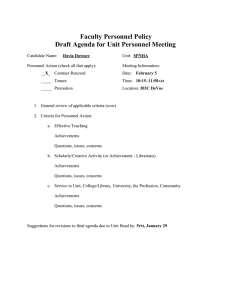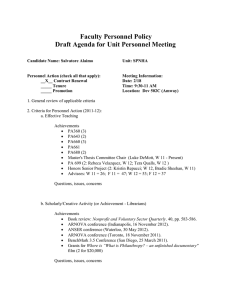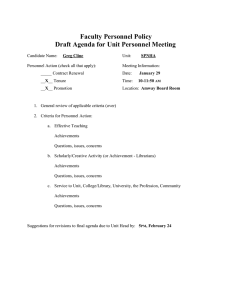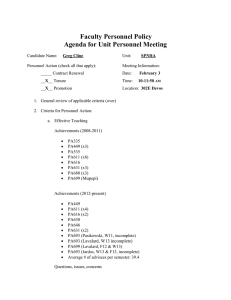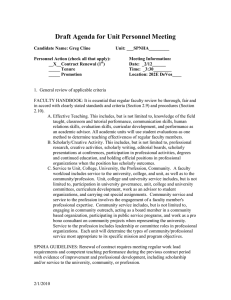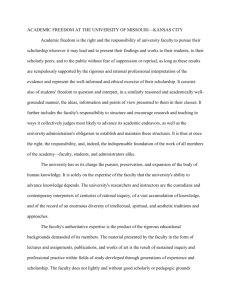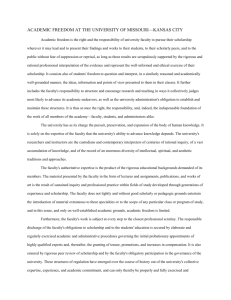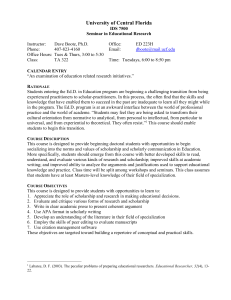Faculty Personnel Policy Agenda for Unit Personnel Meeting
advertisement
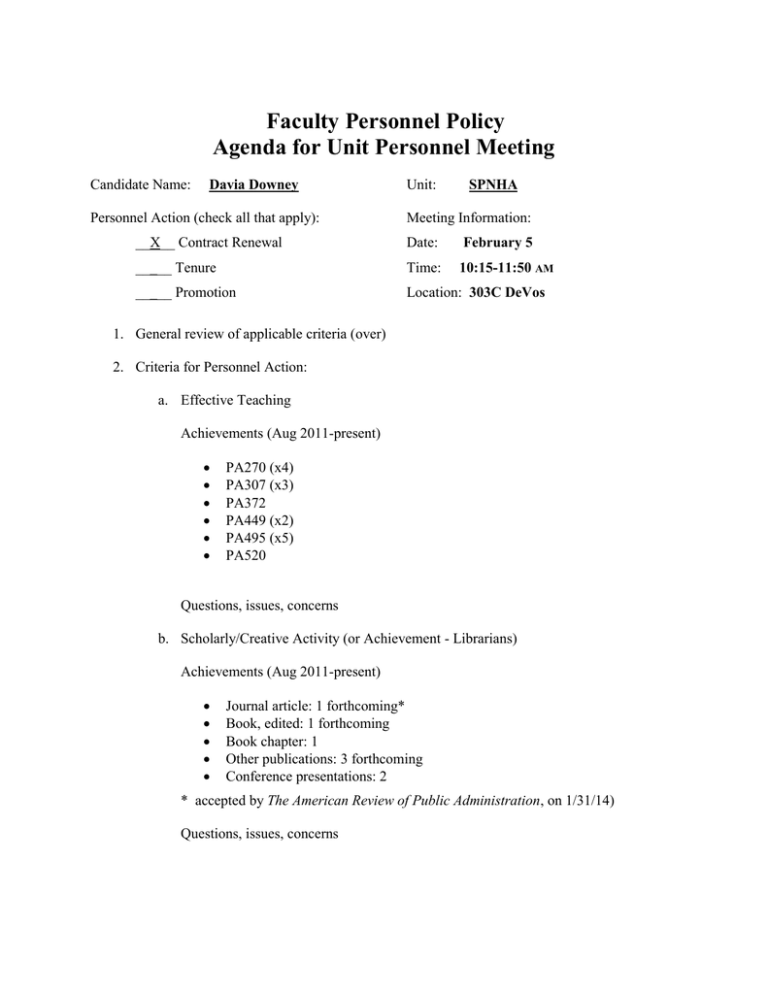
Faculty Personnel Policy Agenda for Unit Personnel Meeting Candidate Name: Davia Downey Personnel Action (check all that apply): Unit: SPNHA Meeting Information: __X__ Contract Renewal Date: February 5 _____ Tenure Time: 10:15-11:50 AM _____ Promotion Location: 303C DeVos 1. General review of applicable criteria (over) 2. Criteria for Personnel Action: a. Effective Teaching Achievements (Aug 2011-present) PA270 (x4) PA307 (x3) PA372 PA449 (x2) PA495 (x5) PA520 Questions, issues, concerns b. Scholarly/Creative Activity (or Achievement - Librarians) Achievements (Aug 2011-present) Journal article: 1 forthcoming* Book, edited: 1 forthcoming Book chapter: 1 Other publications: 3 forthcoming Conference presentations: 2 * accepted by The American Review of Public Administration, on 1/31/14) Questions, issues, concerns c. Service to Unit, College/Library, University, the Profession, Community Achievements (Aug 2011-present)) SPNHA faculty evaluation and undergraduate subcommittee CCPS College Curriculum Committee Adviser: Pencils to Promise Board: Michigan Capital Area Chapter, ASPA . Questions, issues, concerns UNIVERSITY STANDARDS Renewal of Probationary Appointments. Appointment renewals for regular faculty on probationary appointments normally will be for a period of three (3) years. A renewal for less than three years may be recommended if: a) b) c) d) The three (3) or two (2) year period extends beyond the regular faculty member's total probationary period; The College's Personnel Committee recommends a one (1) or two (2) year renewal and the recommendation is accepted by the Dean; The Dean recommends a one (1) or two (2) year contract and gives the College's Personnel Committee the reasons for such action; The regular faculty member does not have the accepted terminal degree in the discipline. A. Effective Teaching. Effective teaching facilitates student learning and includes, but is not limited to, knowledge of the field taught, classroom and mentoring performance, and communication and human relations skills. Faculty members teach effectively by challenging and engaging students, by supporting their academic and professional growth, and by establishing and maintaining high academic standards. They address in their courses relevant knowledge together with intellectual and practical skills pertinent to the discipline or profession. They use appropriate pedagogies and relevant assessments of student learning. They contribute to revising or developing courses and curricula as needed by their units. Effective teaching must be documented by: a) self-evaluation, b) peer evaluation, and c) student evaluations. B. Scholarly/Creative Activity. This includes, but is not limited to, professional research, creative activities, scholarly writing, editorial boards, scholarly presentations at conferences, participation in professional activities, degrees and continued education, and holding official positions in professional organizations when the position has scholarly outcomes. C. Service to Unit, College, University, the Profession, and the Community. A faculty workload includes service to the unit, College, and University, as well as to the community/profession. Unit, college and university service includes, but is not limited to, participation in university governance, unit, college and university committees, curriculum development, serve as an advisor to student organizations, and carry out special assignments. Community service and service to the profession involves the engagement of a faculty member's professional expertise. Community service includes, but is not limited to, engaging in community outreach, acting as a board member in a community based organization, participating in public service programs, and work as a pro bono consultant on community projects when representing the University. Service to the profession includes leadership or committee roles in professional organizations. Each unit will determine the types of community/professional service most appropriate to its specific mission and program objectives. It is the responsibility of each faculty member to describe the nature of the service and the time commitment involved. SPNHA STANDARDS Teaching: At GVSU, teaching is the most important aspect of your evaluation as a faculty member. An excellent teacher is one who is able to apply appropriate teaching methods and technologies to a topic area and successfully engage students in the learning enterprise. All faculty members should strive for excellence in teaching, which means that both students and colleagues recognize that your teaching methods and course content are effective, innovative, and up-to-date or even at the cutting edge of your field. Student advising is an aspect of this dimension of faculty performance. Effective advising entails keeping regular office hours, staying well informed of the curricula and university requirements, and helping students select courses that fit their interests and career goals. Criteria of effective teaching include, but are not limited to: Knowledge of the field taught Classroom performance (e.g. clarity, pacing, breadth and depth of coverage) Communication skills Evaluation skills Course development Performance as an academic advisor Faculty members should maintain a careful, complete, and consistent record of their course design, activities, and methods. The ability to articulate one’s teaching methods is critical to faculty evaluation (see section below on candidate portfolio). Scholarship. Scholarship is an integral part of the mission of the School of Public, Nonprofit, and Health Administration (SPNHA) at GVSU. SPNHA faculty members demonstrate their professional development by contributing scholarly articles, books, and reports to the peer reviewed academic literature in their fields of expertise, and to organizations that serve the public. Examples and types of scholarship include, but are not limited to: Original research (creation of knowledge) Integration of knowledge (synthesis and reorganization). Review articles and books, metaanalyses, and well-crafted texts that bring diverse findings together, including theoretical analyses, surveys, analyses of archival data, outcome research, qualitative and case studies Application of knowledge (e.g. research reports, program audits, program evaluation) Scholarship of pedagogy and teaching in public affairs and administration. While the form of scholarly work may vary, all scholarship will be evaluated using the same framework. To qualify as scholarship, the critical elements of scholarship outlined above will be considered. For purposes of determining professional achievement and excellence, work must reflect a high level of expertise through substantive content and contribution to the field beyond those involved in other faculty duties (e.g. teaching and service). In order to reach this determination, the work should involve a product that is peer reviewed by qualified professionals using the following criteria: Theoretical conceptualizations conveyed by the work Methodological considerations reflected in the work Appropriateness of analytical methods used and conclusions reached Implications for professional practice Ethical considerations and professional integrity. Community Service. Serving the community is an important part of the career of faculty members in SPHNA. The expertise developed in scholarship and teaching ought to be made available to the organizations that provide services to the public. Faculty members do this by serving on boards of directors, by consulting, by participating in public forums and speaking to organizations on current affairs, providing interviews with the media, writing columns in local newspapers, etc. Faculty must demonstrate that their community service is related to or flows from their academic expertise and interests. Community can also include one’s professional community, and activities such as reviewing journal articles, serving on conference program committees, moderating panels at professional conferences, etc., are among examples of service to one’s professional community. Unit and University Service. Service to the unit and university involves curricular development for SPNA, course development for general education, proposal writing, and serving on unit, divisional, and university-wide committees. Examples include: Committee assignments Curricular development Special unit assignments Writing letters of recommendation Mentoring colleagues Enhancing public relations
